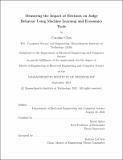| dc.contributor.advisor | Autor, David | |
| dc.contributor.author | Chin, Caroline | |
| dc.date.accessioned | 2022-02-07T15:24:06Z | |
| dc.date.available | 2022-02-07T15:24:06Z | |
| dc.date.issued | 2021-09 | |
| dc.date.submitted | 2021-11-03T19:25:27.630Z | |
| dc.identifier.uri | https://hdl.handle.net/1721.1/140100 | |
| dc.description.abstract | Judges play a critical role in maintaining a fair and independent criminal justice system. Using a combination of empirical tools from Computer Science and Economics, this paper examines the effects of judicial elections on decisions by magistrate court judges in Pennsylvania. I find that judges who are running in contested primary races dismiss fewer cases in the months leading up to their election. This effect is driven mostly by changes in the treatment of misdemeanor cases. Judges running in competitive primary races dismiss 16.2% fewer misdemeanor cases in the three months preceding their election date. This effect is consistent across estimates derived from linear regression methods as well as machine learning methods including lasso, decision tree and random forest models. In the context of prior research, these findings suggest that electoral pressure induces harsher treatment by judges across all stages of the judicial system. | |
| dc.publisher | Massachusetts Institute of Technology | |
| dc.rights | In Copyright - Educational Use Permitted | |
| dc.rights | Copyright MIT | |
| dc.rights.uri | http://rightsstatements.org/page/InC-EDU/1.0/ | |
| dc.title | Measuring the Impact of Elections on Judge Behavior Using Machine Learning and Economics Tools | |
| dc.type | Thesis | |
| dc.description.degree | M.Eng. | |
| dc.contributor.department | Massachusetts Institute of Technology. Department of Electrical Engineering and Computer Science | |
| mit.thesis.degree | Master | |
| thesis.degree.name | Master of Engineering in Electrical Engineering and Computer Science | |
